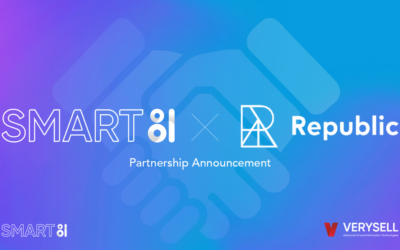On November 20th, SMART81 hosted a thought-provoking webinar featuring Charles Russell, Practice Lead at SMART81, and James Flavin, Founder of KiteEdge. The session, hosted by Emily Fitchett, Global Head of Partnerships at R Europe (formerly Seedrs), offered actionable insights for startups navigating today’s fast-paced business environment.
For those who weren’t able to join the conversation, here’s a recap of the key points and takeaways that shaped the discussion:
Watch the full webinar recording here.
Key Takeaways for Startups: Scaling with Outsourcing
Charles kicked off the discussion with practical advice on how startups can approach outsourcing. He emphasized that scaling a business is about making the right strategic decisions – one of which is understanding when and what to outsource. “Startups should focus on keeping core functions in-house while outsourcing non-core tasks”. He stressed that outsourcing could help startups grow efficiently by allowing internal teams to focus on what they do best, while external experts handle specialized tasks.
Charles also shared his insights on building strong partnerships with outsourcing providers. “Outsourcing isn’t about giving away control. It’s about working with partners who can handle the complexities, freeing your team to focus on scaling.” He stressed that selecting the right partner, one who truly understands your vision and can evolve with you, is essential for long-term success.
The Challenge of Scaling: Lessons from KiteEdge
Building on Charles’s point about finding the right external help, James Flavin, Founder of KiteEdge, shared his experience of scaling an AI startup in a highly competitive market. “The biggest challenge we faced at KiteEdge was differentiating ourselves from the competition,” James began, highlighting the struggle of standing out in an industry full of innovators. Despite an exciting product, KiteEdge initially faced challenges with market fit. “The question investors kept asking us was: ‘Is anyone actually going to use this product?’”
James’ journey underscored a key lesson: having a great product is only part of the equation—market fit, resources, and traction are just as important for scaling successfully. He also shared the turning point at KiteEdge, which came when the team realized they needed to seek external expertise in order to scale quickly. “Outsourcing helped us access specialized talent fast, without overburdening our internal team,” James explained. By outsourcing complex tasks, KiteEdge was able to focus on its core strengths: product innovation and customer acquisition.
James went onto emphasized the importance of flexibility in scaling, and how partnering with SMART81 gave KiteEdge the ability to scale without compromising on quality. “SMART81 provided the flexibility we needed to scale while maintaining the quality we required,” he said, underscoring how outsourcing technical work to trusted partners allowed them to focus on strategic growth.
The Outsourcing Dilemma: When is the Right Time?
Emily Fitchett then brought up a critical question: When is the right time to outsource for startups? Emily and the panelists discussed the dilemma of when to start outsourcing as a startup. As James admitted, “We waited too long, trying to do everything ourselves,” which led to inefficiencies and slower growth. Charles emphasized that early outsourcing is often better, allowing startups and their best developers to grow without becoming bogged down by core tasks.
For Charles, the key takeaway is that startups should start outsourcing once they’ve validated their product and are ready to scale. Outsourcing, he said, should be seen as an extension of the internal team—not as a last resort. He also highlighted that it’s important to decide early on what functions should remain in-house, especially when it comes to intellectual property (IP).
Domestic vs. International Outsourcing: What’s the Best Fit?
The discussion took an interesting turn as the panel explored the pros and cons of domestic vs. international outsourcing. While many startups consider outsourcing locally to avoid potential communication issues or cultural differences, James and Charles both argued that international outsourcing often provides significant advantages, particularly when it comes to cost savings and access to a broader pool of talent.
James shared how KiteEdge worked with SMART81’s team in Vietnam, explaining how the partnership allowed them to tap into high-quality work at a fraction of the cost of hiring in the UK or US. “Working with a partner in Vietnam gave us access to talented developers who could help us scale rapidly,” James noted.
However, both panelists stressed that international outsourcing requires careful planning, particularly around communication and quality control. James and Charles both highlighted the importance of setting up reliable project management systems and maintaining clear communication channels to avoid misunderstandings.
The Smart Way to Scale: Building Partnerships That Last
As the webinar drew to a close, the panelists reflected on the long-term nature of outsourcing relationships. James, Emily, and Charles all agreed that the most successful outsourcing strategies are built on trust and alignment with your partner. “Outsourcing is not just about offloading tasks; it’s about building a long-term partnership that will help your startup grow and evolve,” James explained.
Charles added that scaling smart is about finding the right balance between in-house and outsourced work. “With the right partner, you can scale quickly and efficiently without sacrificing quality or control”.
Final Thoughts
The key message from the webinar is clear: Outsourcing is a vital tool for startup growth. Whether it’s leveraging specialized talent, cutting costs, or scaling rapidly, outsourcing can help startups move faster and smarter. As James Flavin, Emily Fitchett, and Charles Russell shared, partnering with the right outsourcing provider is essential for overcoming the challenges of scaling a business.
For startups looking to scale efficiently, SMART81 and R Europe offer the expertise and flexibility needed to navigate the complexities of outsourcing. By finding the right partners and making strategic decisions about what to outsource, startups can focus on what matters most – growing their business and achieving long-term success.
Stay tuned for more valuable insights from SMART81’s future webinars, and don’t hesitate to reach out if you’re ready to scale your startup smarter with the right outsourcing strategy.



